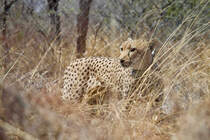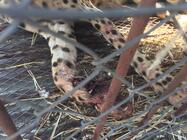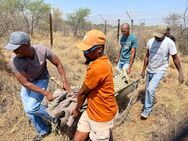We have also received a number of calls about conflicts experienced with cheetahs in a particular hot spot around the town of Ncojane, near the border with Namibia. Sixteen goats had been lost across three farms prompting CCB’s Farming for Conservation (FFC) team rushed to assist. Under normal circumstances, any farmer of smallstock experiencing conflict with cheetahs would quickly receive a livestock guarding dog puppy to help with long-term management of their herds. However, due to a recent and devastating outbreak of canine parvovirus across the country, many of the puppies that came into our care had been carrying the disease upon arrival and sadly perished. This has left our LGD programme short of puppies and with the persistent waiting list to receive a trained dog from CCB. Given extent of conflict in Ncojane and the wait for LGD puppies, CCB lent the most severely impacted farmer, Mr. Calvin Seitsang, CCB’s own experienced and highly effective LGD from our demonstration farm. “Gift” has been one of CCB’s LGDs since 2016 and has not only protected a total of 173 goats and sheep, but has also helped teach 130 LGD puppies the tricks of the guarding dog trade – helping to train them before they are placed with farmers in need.
Having Gift on loan from CCB helps create a short-term, immediate solution to their problems, aiming to deter the problem cheetahs from the herds that have been affected, in an attempt to break any patterns of livestock depredation before they become habitual. The FFC team are planning our next mobile farmers workshops in that area to support skills sharing in carnivore-friendly farming techniques with these farmers. The Ncojane area is notorious for desertification caused by poor livestock management practices and bushmeat poaching. These two factors result in a combination of unproductive rangelands, resulting in weak livestock and very few wild prey animals respectively. This creates a perfect storm to increase the risk of cheetahs, African wild dogs and lions preying on livestock. Thankfully, the holistic nature of our farmers workshops, which focus on everything from grazing management, anti-poaching, reducing the risk of depredation and herd health, will certainly be valuable in helping these farmers to make their farms profitable again.




 RSS Feed
RSS Feed
